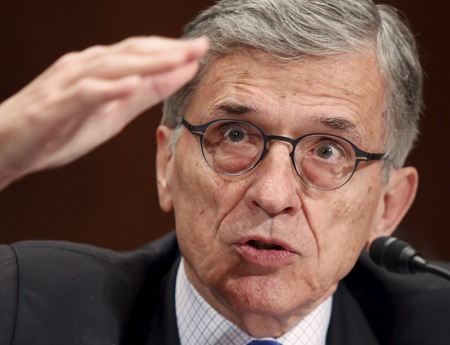Wheeler: FCC Will Be Flexible With Auction Exit Deadline

The smarter way to stay on top of broadcasting and cable industry. Sign up below
You are now subscribed
Your newsletter sign-up was successful
There was news to be gleaned from the FCC oversight hearing in the House Communications Subcommittee Tuesday, including confirmation of earlier reports in B&C that the over-the-top redefinition proposal was on the back burner for the foreseeable future.
Among the other takeaways from the three-plus-hour hearing were:
FCC chairman Tom Wheeler's pledge—joined by all the other commissioners—that the FCC would not be forcing broadcasters off the air who missed the 39-month post incentive auction deadline for moving to new channels; Wheeler's signal that the FCC would not be taking any action on a new consumer privacy regulatory framework for ISP broadband nets until at least early next year; also confirming earlier reports in B&C, the chairman's separate proposal, already circulated to the commissioners, to eliminate exclusivity rules is on the back burner, with Wheeler signaling that the separate retrans good faith negotiations inquiry is the "appropriate" place to address that issue.
Asked by Rep. Doris Matsui (D-Calif.) about her broadcaster constituent concerns that they could be forced off the air if they did not meet the 39-month deadline, Wheeler explained that it was not a "drop off the edge of the table" scenario. He said that there was an extra six months built in, and that the FCC would work with broadcasters.
But he also pointed out that the National Association of Broadcasters had suggested they only needed 30 months for the transition.
After the hearing, NAB quickly put out a statement saying that was not the whole story.
"FCC Chairman Wheeler today told the House Commerce subcommittee chaired by Rep. Greg Walden (R-Ore.) that NAB supported a 30 month "repacking" deadline after the TV auction," NAB said in a statement. "Chairman Wheeler's statement does not tell the whole story."
The smarter way to stay on top of broadcasting and cable industry. Sign up below
"In its initial comments in January 2013, NAB argued that the FCC’s proposal setting a repacking deadline of 18 months was misguided. We asserted that the FCC would need at least 30 months for repacking, and that it should use the $1.75 billion relocation fund as a budget for repacking – estimating that could cover 400-500 stations. Since that time, three things have happened. First, the FCC has released repacking simulations suggesting that well over a thousand stations (more than twice as many as anyone anticipated) could need to move. Second, the FCC adopted a hard deadline for all stations to move, which surprisingly would force them off the air regardless of circumstances. Third, NAB undertook a study earlier this year – the first of its kind – that analyzed how long it would take to conduct a nationwide repack. We shared this study with the FCC a number of months ago. Both the scope of repacking and the consequences for broadcasters unable to move are radically different than proposed or contemplated in the record."
Rep. Adam Kinzinger (R-Ill.) suggested that 39 months might not be enough time for broadcasters to finish their move given that 1,100 stations could be moving and competing for tower crews, consultants, and antenna space.
When Kinzinger asked whether, if stations could not meet the 39-month deadline for moving, the FCC would force them off the air, Wheeler joined with the other commissioners to say no.
Kinzinger also pressed on the issue of the $1.75 billion relocation fund and whether the FCC would have to prioritize expenses—taking from one broadcaster to pay another—or go beyond the $1.75 billion.
Wheeler said it was not the FCC's business to prioritize reimbursement of TV station moving expenses, but did not exactly commit to not doing so if the costs exceeded the $1.75 billion in the statute for reimbursement. He did say the FCC might have to go back to Congress if it ran out of money before it ran out of stations. Thought he pointed out these were hypotheticals—the FCC has said it thinks the $1.75 billion will be enough.
Contributing editor John Eggerton has been an editor and/or writer on media regulation, legislation and policy for over four decades, including covering the FCC, FTC, Congress, the major media trade associations, and the federal courts. In addition to Multichannel News and Broadcasting + Cable, his work has appeared in Radio World, TV Technology, TV Fax, This Week in Consumer Electronics, Variety and the Encyclopedia Britannica.

